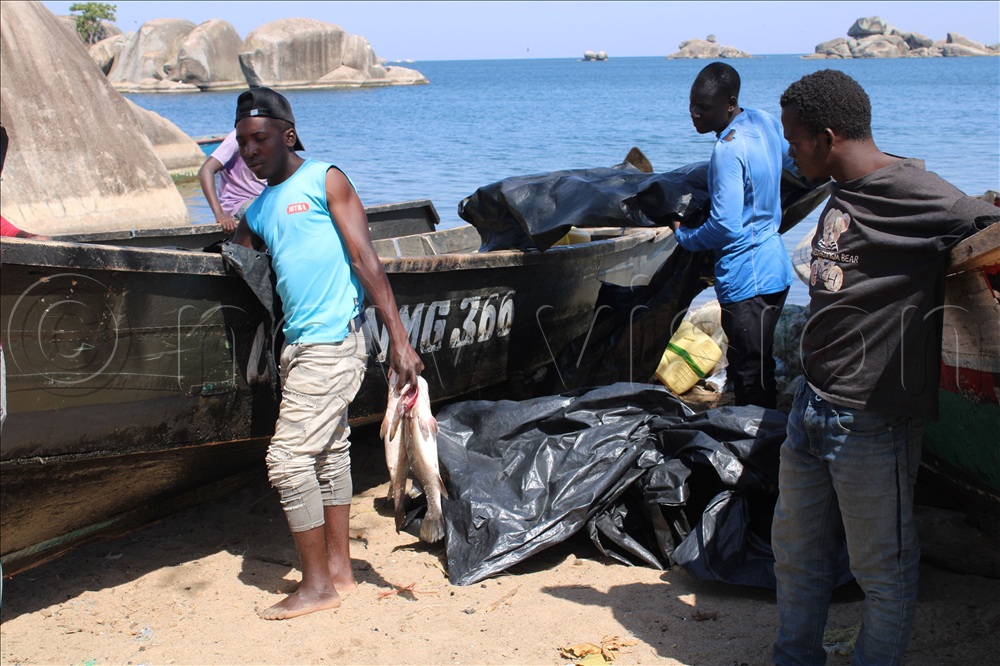Namayingo fisherfolk want affirmative programme for fishing communities
Francis Koowa, a fisherman at Hama Island, said their livelihoods have been ruined and they have no alternative means to sustain their households.
Women lay out fishing nets to dry at Kandege landing site in Namayingo. (Photos by Betty Angatai)
________________
Fisherfolk in Namayingo district have urged the Government to establish and design affirmative action programmes for fishing communities on Lake Victoria.
They say the strict enforcement operations, dwindling fish stocks and lack of viable alternatives have plunged thousands of households in poverty.
“We are surviving by God’s mercy. When the operations intensified, they burnt our nets and impounded our boats. We have nothing left. We cannot feed our families anymore,” said James Wandera, a resident of Wayasi Island.
For many residents who have spent their entire lives depending on Lake Victoria for survival, the Uganda Peoples Defence Forces enforcement has hit them hard.
Wandera said that the ban on mukene (silver fish) fishing, coupled with the destruction of boats and confiscation of illegal gear, has left communities struggling to cope.
Francis Koowa, a fisherman at Hama Island, said their livelihoods have been ruined and they have no alternative means to sustain their households.
Another fisherman, Moses Waiswa of Lugala landing site, said many of them now live under constant fear.
“The UPDF treat us like criminals even when all we wanted was to feed our children. They beat us, chased us off the lake,” Waiswa said.
A group of fishermen at Lolwe landing site.
Namayingo LC5 chairperson Ronald Sanya said the district’s population is overwhelmingly reliant on fishing, and therefore needs affirmative action similar to what the government implemented in Karamoja after the disarmament exercise.
“76% of Namayingo residents depend entirely on Lake Victoria for survival. This lake is a God-given resource and has sustained our people for generations. But today, most homes are struggling to earn a living,” Sanya said.
He acknowledged that some fishermen were involved in illegal fishing, but insisted that the UPDF enforcement left entire communities helpless.
“Boats were burnt, engines confiscated, and fishing nets destroyed. Now the same fishermen have become redundant and are turning into a security concern because they have no alternative sources of income,” he said.
He proposed that the Government introduces a special programme, including grants to buy recommended fishing gear, engines and boats.
“Fishing is an expensive enterprise. The revolving fund for parish development model is not enough for fisherfolk whose minimum investment is far higher compared to other enterprises,” Sanya said.
He said the funds are inadequate to purchase all the recommended fishing gear.
Under the Parish Development Model strategy, each beneficiary receives shillings one million.
The fisherfolk also asked President Museveni to engage the Kenyan government over what they describe as uncontrolled and destructive fishing practices by Kenyan fishermen on the Ugandan side of the lake.
According to Sanya, Kenyan fishermen have continued to use banned fishing gear to fish, while Ugandans are barred from similar practices.
“Our people are being denied opportunities in their own waters while Kenyans cross into Uganda with illegal gear to fish freely,” Sanya said.
Sarah Nabirye, a resident of Lolwe Islands who used to trade in mukene, said the situation has become economically draining.
“We feel abandoned. We were told to follow the law, but the same law is not applied to Kenyans who come into our waters. Our children are not going to school because we have no income. We need the President to listen to us.” Nabirye said.
“It is we who are suffering while our neighbours are enjoying our lake. This is not good. If our government does not want us to fish, then let it get us other alternatives where we can be able to earn a living,” said David Wanjala, a fisherman at Matiko landing site.
With President Museveni expected to campaign today, November 19, 2025, in the districts of Namayingo and Mayuge, residents hope their plight will finally be addressed.
“We are not asking for handouts, but we are asking for a fair chance to work and live with dignity,” he said.